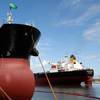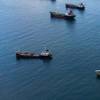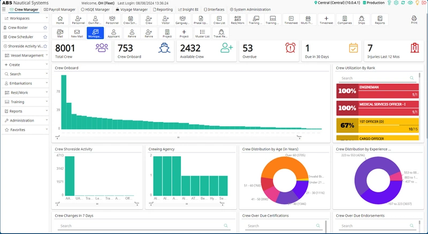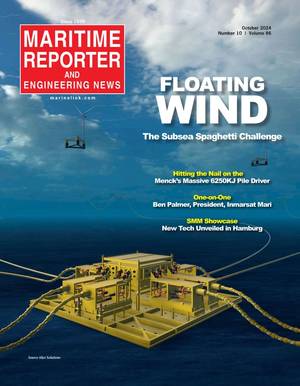Vehicle Carrier Ship Hit by Explosion in Gulf of Oman
An Israeli-owned ship, the MV HELIOS RAY, was hit by an explosion in the Gulf of Oman overnight Thursday and a U.S. defense official said the blast left holes in both sides of the vessel's hull. The cause was not immediately clear.
The vehicle-carrier ship is owned by a Tel-Aviv based company called Ray Shipping through a company registered in the Isle of Man, according to a U.N. shipping database.
"Investigations are ongoing. Vessel and crew are safe," the United Kingdom Maritime Trade Operations (UKMTO) said in an advisory notice on Friday. It urged vessels in the area to exercise caution.
The U.S. defense official told Reuters in Washington that the ship was hit by a blast above the water line that ripped holes in both sides of its hull.
Israel's Kan broadcaster named the ship's owner as Rami Ungar and quoted him as saying: "The damage is two holes, diameter approximately 1.5 meters, but it is not yet clear to us if this was caused by missile fire or mines that were attached to the ship.
"There is no damage to the engine, and no casualties among the crew. We have no idea whether this was an incident that was past of the tensions between Iran and the United States and whether there is a link to the fact the ship’s owner is Israeli," Kan reported Ungar as having said.
The incident occurred at 2040 GMT on Thursday, UKMTO said, but it gave no details about a possible cause.
Maritime security firm Dryad Global said the ship was en route to Singapore from Dammam in Saudi Arabia.
The vessel is managed by Stamco Ship Management, Refinitiv ship tracking data showed. Stamco Ship Management declined to comment when contacted by phone by Reuters.
"Whilst details regarding the incident remain unclear it remains a realistic possibility that the event was the result of asymmetric activity by Iranian military," Dryad said in a report on the incident.
Refinitiv data shows the ship has set Dubai as its current destination.
The U.S. Navy's Bahrain-based Fifth Fleet said it was aware of the incident and monitoring the situation.
Tensions have risen in the Gulf region since the United States reimposed sanctions on Iran in 2018 after then-President Donald Trump withdrew Washington from Tehran's 2015 nuclear deal with major powers.
Washington has blamed Iran for a number of attacks on shipping in strategic Gulf waters, including on four vessels, including two Saudi oil tankers, in May 2019. Iran distanced itself from those attacks.
In early January, Iran's Revolutionary Guards seized a South Korean-flagged tanker in Gulf waters and detained its crew amid tensions between Tehran and U.S. ally Seoul over Iranian funds frozen in South Korean banks due to U.S. sanctions.
In 2018, 21 million barrels per day of oil flowed through the Gulf's Strait of Hormuz, equivalent to about 21% of global petroleum liquids demand at the time, according to the U.S. Energy Information Administration.
(Reporting by Lisa Barrington with additional reporting by Dan Williams and Idrees Ali; Editing by Mark Heinrich)













